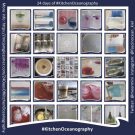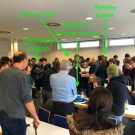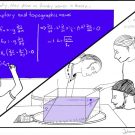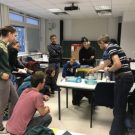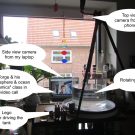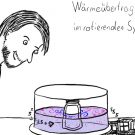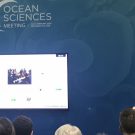by Willi Rath About a year ago we introduced the GEOMAR (open!) Hacky Hour, a weekly (virtual) programming and data analysis support meeting compensating for missing door-to-door exchange in the office during the COVID-19 pandemic. This is about our lessons learned along the way. If you’re interested in participating or have any other questions or […]
Digitale Teaching goes Web
“WebLab — Web-based computing lab”: Lessons Learned Authors: Martin Claus (PI) & Willi Rath (co-PI) German version: https://www.einfachgutelehre.uni-kiel.de/allgemein/digitale-lehre-weblab/funded by PerLe-Fonds für Lehrinnovation weblab.uni-kiel.de is a virtual computer lab which can be accessed at any time and from everywhere in the world. Originally, it was set up to leave behind crowded physical computer labs. With the […]
Oceanography advent calendar? Yes, please!
“Kitchen Oceanography” means doing simple experiments with household items and learning a lot about ocean physics along the way. The “24 days of kitchen oceanography” advent calendar is a perfect way to get involved! From December 1st, there will be daily experiments posted all throughout to the 24th — come over and join in the […]
#KitchenOceanography: Bringing physical oceanography into students’ homes
This is the longer version of the (A4!) poster that I presented on behalf of myself, Kjersti Daae, Elin Darelius, Joke Lübbecke and Torge Martin at the #FieldWorkFix conference last Tuesday (September 8, 2020). If you would rather listen to the voiceover than read the transcript below, please feel free to do that! (Thanks to Torge, the voice over […]
Using multiple rotating tables in undergraduate education — a field report
The affordable rotating LEGO tables that we’ve been using for the last year were developed by the DIYnamics Team. This is a repost of a guest post that I wrote for their blog: When we came across the DIYnamics article right after its publication, Torge and I (Mirjam) were very excited about the endless possibilities we saw opening up […]
Hands-on atmosphere & ocean dynamics in a comic? Now available in English!
When we started our “dry theory to juicy reality” project, our goal was to bring ocean and atmosphere dynamics to life and get students excited about investigating them in a rotating tank. Judging from all the feedback we got, this seems to have worked really well! Read Johanna Knauf’s comic for a student’s perception of […]
Alles andere als trockne Theorie: Unser Gastbeitrag bei PerLe
Über eine Lehrinnovation, die auf Kleingruppenarbeit und „hands-on“-Praxiselemente setzte – und was in Zeiten von Covid-19 daraus wurde. Hier ein Repost eines Beitrages, den wir für den “Einfach gute Lehre”-Blog geschrieben haben: In der Lehrveranstaltung „Atmosphären- und Ozeandynamik” im Bachelorstudiengang Physik des Erdsystems wird das theoretische Grundgerüst zum Verständnis der globalen Bewegung von Luft- und […]
“Remotely controlled” kitchen oceanography
This semester is turning out a little different from what we had hoped, but it has presented the opportunity to try our new things: Torge and his class join me in my kitchen! I log into their online class with two devices, one looking at the tank from the top, the other looking from the […]
AOD Comic: Wellengleichungen im Wassertank
Die wohl beste Zusammenfassung unserer Bemühungen im letzten Semester, Studierenden einen anderen, praxisbezogeneren, letztlich schlicht spaßigeren Zugang zu Atmosphären- und Ozeandynamik (AOD) zu bieten, stammt von Johanna Knauf:
Ocean Sciences Meeting, San Diego, Monday morning 8 a.m.
Here we go, a full week of exciting science presentations lies ahead of us. The Ocean Sciences Meeting is a large scientific conference devoted entirely on new discoveries in ocean physics, biology, chemistry, … from hot topics in the tropics to cool stuff in the rapidly changing polar regions. About 5,000 scientists from around the […]
